Featured
Weibo Watch: Frogs in Wells
Taiwan elections discussions remained relatively muted on Weibo, with limited hashtags and controlled narratives. Read more about what’s trending, from Harbin to Xinjiang, in this 22nd edition of Weibo Watch.
Published
6 months agoon

PREMIUM NEWSLETTER | ISSUE #22
This week’s newsletter:
◼︎ 1. Editor’s Note – Frogs in wells
◼︎ 2. What’s Been Trending – A closer look at the featured stories
◼︎ 3. What More to Know – Five bit-sized trends
◼︎ 4. What’s the Drama – Top TV to watch
◼︎ 5. What Lies Behind – Xinjiang as copy cat
◼︎ 6. What’s Noteworthy – Balloons up in the air
◼︎ 7. What’s Popular – Jia Ling’s back in the spotlight
◼︎ 8. What’s Memorable – Gu, the controversial snow princess
◼︎ 9. Weibo Word of the Week – “Southern Little Potatoes”
Dear Reader,
While the Taiwan elections have been making headlines in international media for the past two weeks, discussions about the topic haven’t been as buzzing on Chinese social media.
As voters across Taiwan headed to the polls to elect a new president, the world watched closely as the three-way race between Kuomintang’s Hou Yu-ih, Taiwan People’s Party’s Ko Wen-je, and Lai Ching-te of the Democratic Progressive Party unfolded. Meanwhile, Weibo’s trending topic lists were predominantly filled with entertainment and travel news.
In the hours following the news that Lai Ching-te (赖清德) was elected to be Taiwan’s president, you could almost hear the crickets on the social media platform, where the only news accounts posting about the election’s outcome on Saturday evening were the Russian state-owned Ruptly and RT. Hashtags that had been active earlier in the day suddenly disappeared during the night, including the “Taiwan elections” (#台湾选举#) hashtag, and new ones like “Lai Ching-te wins the 2024 Taiwan regional leadership election” (#赖清德赢得2024年台湾地区领导人选举#).
Since the Democratic Progressive Party (DPP) came to power in 2016, Chinese official media have described the ruling party as collaborating with “external forces” to seek independence and pursuing policies hostile to the mainland. Lai Ching-te, also known as William Lai, has stated that he is determined to safeguard Taiwan from threats and intimidation from Beijing and to maintain the cross-strait status quo.
“We can only wait for the mainland media to announce the results,” one prominent Taiwan-focused blogging account remarked on Saturday night, awaiting Chinese state media to come up with the ‘correct’ headlines and hashtags needed to facilitate further discussions on the platform.
By 22:45 Beijing time, about three hours after the election results made international headlines, Chinese official media channels such as Xinhua and Global Times finally reported about Lai’s win, citing spokesperson Chen Binhua of the Taiwan Affairs Office. He stated that the DPP win does not represent the Taiwanese mainstream; that Taiwan is a part of China; and that the island’s future reunification with the motherland will not be affected. Comment sections were switched off.
Some bloggers wondered why Weibo had seemingly blocked the election results from the hot search lists and why the topic was so controlled. After all, they said, isn’t this just about “the new governor of Taiwan province”? Some commenters jumped on other popular hashtags, mainly related to the super popular ‘Weibo Night’ event, to express views on the elections or how underreported they were. Weibo commenters also used phrases such as “poison frogs,” “Tai[wan] frogs,” or “the frog village has elected its new chief” to discuss the election results.
On Chinese social media, people from Taiwan are often referred to as frogs, inevitably leading to other frog-related phrases to talk about the island. The ‘Taiwan frog’ meme, which has become especially widespread during Tsai’s rule, is a reference to the well-known fable by philosopher Zhuangzi about a frog in a well who does not believe it when a turtle tells him that the world is bigger than the view from the well. The frog stubbornly denies the existence of the wider world and asserts that nothing lies beyond what he can see. The idiom ‘frog in the well’ (井底之蛙 jǐngdǐzhīwā) thus refers to people who are narrow-minded and who have a limited outlook on their life and surroundings.
The frog meme is used to describe Taiwanese who are thought to be confined to their island’s perspective and unable to see beyond it. It’s a play on words, as Tai-wan 台湾 and Tai-wa 台蛙 (= Tai-frog) sound similar. Mainlanders started calling Taiwanese ‘little frogs’ (蛙蛙) when they encountered Taiwanese commentators talking about the mainland as if it were underdeveloped and backward, seemingly unaware of China’s rapid progress over the past decades. A notable example is a Taiwanese TV host who, years ago, claimed that people in China couldn’t even afford boiled tea eggs and packaged pickled vegetables, sparking many jokes on Chinese social media.
Of course, there is some irony in Chinese netizens referring to Taiwanese as if they’re stuck in a well when Chinese narratives about Taiwan are so controlled and are mostly focused on cross-strait relations alone. On Sunday morning, the election result finally showed up in Weibo’s top trending lists with the hashtag “Taiwan is part of China, this basic fact won’t change” (#台湾是中国一部分的基本事实不会改变#). The hashtag had received over 260 million views by afternoon. Its main post by CCTV accumulated over 6329 replies. However, only 17 of them were visible, each and every single one reaffirming: “There is only one China.”
In this social media age, both in China and globally, it’s all too easy to find ourselves in echo chambers and filter bubbles, where we’re exposed only to voices that echo our existing beliefs — aren’t we all ‘frogs in the well’ at some point? Observing discussions about Taiwan on Western social media platforms, most commenters tend to narrow their focus to the elections, framing them as purely geopolitical. This perspective can create the impression that Taiwanese voters only express views that can be labeled as ‘pro-US,’ ‘anti-mainland,’ or ‘pro-China.’
“It’s not war with China that Taiwan’s young voters worry about, it’s jobs, housing, wages,” BBC’s Tessa Wong posted on X, where political scientist Sheena Chestnut Greitens added: “Important reminder: outside observers view Taiwan’s election primarily through the lens of geopolitical tensions and the threat of conflict, but many Taiwan voters also prioritize more bread-and-butter issues.”
Not everything is about great power struggles; not everything is about China vs the US; and not everything is a competition. This reminds me of something else I’d like to briefly share with you here. When The Guardian reached out to me a few weeks ago and asked if there was a topic I found particularly noteworthy in 2023 when it comes to China’s online environment, I immediately knew I wanted to write about the exploding popularity of ChatGPT, which also became a major topic of discussion across Chinese social media channels at that time: why was ChatGPT not “made in China”? You can read my debut piece for The Guardian, “In the Race for AI Supremacy, China and the US Are Traveling on Entirely Different Tracks,” through this link here.
Miranda Barnes and Ruixin Zhang contributed to this Weibo Watch newsletter, which I hope you find useful.
Best,
Manya
(PS You can also find me on Instagram and Threads nowadays but I’m still most active on X here.)
What’s Been Trending

1: A Snowball Effect | Harbin has been trending every 👏 single 👏 day 👏 on Chinese social media over the past two weeks. The hype surrounding the city and its Snow and Ice Festival is similar to the buzz surrounding Shandong’s Zibo in 2023, and it shows that Chinese tourism boards are seriously stepping up their game in the post-Covid travel era. But although the Harbin hype is the result of a well-coordinated marketing campaign that has been in the making for a year, there is also that special something, the organic buzz, that has snowballed the city’s success this season ✨ . Read all about it here 👇🏼

2: Show-Inspired Journeys | The Chinese TV series Meet Yourself has significantly boosted the popularity of Dali in Yunnan. The series’ success, coupled with the official funding behind it, not only underscores the impactful role of Chinese television dramas in tourism but also illustrates how Chinese travel destination promotional strategies are being reshaped in a competitive post-Covid era.
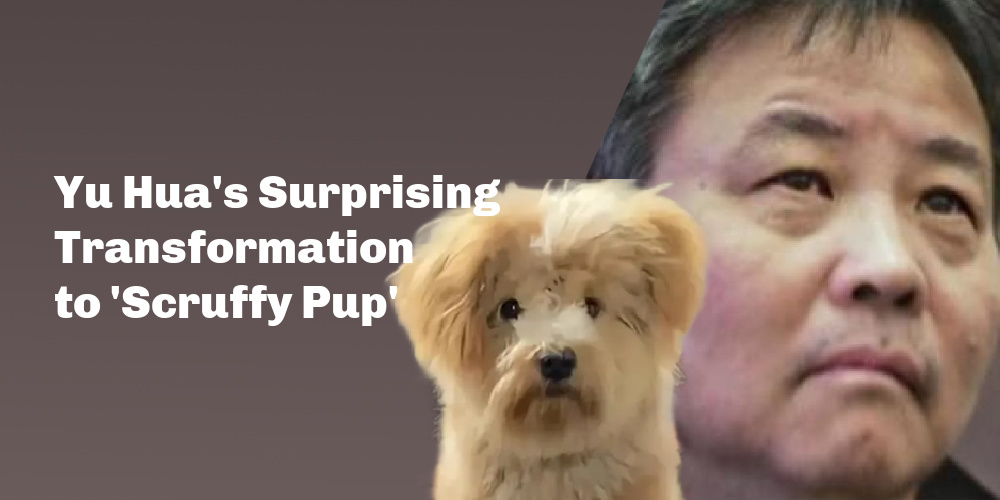
3: From Avant-Garde Writer to Scruffy Pup | On Chinese social media, Yu Hua has transcended his status as one of China’s most renowned contemporary writers. Surrounded by memes, online jokes, and fans born after 2000, he has emerged as a cultural icon for China’s younger generations. His rise as an online celebrity highlights that Chinese youth value relatability and likability over literary prestige.
What More to Know
Besides the bigger international news topics such as the Taiwan elections, Japan earthquake, Middle East crisis, or the Epstein list, these bite-sized topics also went trending on Chinese social media 👇
◼︎ 🌟 Weibo Night | As every year, Weibo Night, unsurprisingly, managed to become the no 1 entertainment topic of the week. It is the much-anticipated live-broadcasted ceremony that looks back on Sina Weibo’s hottest celebrities, entertainment productions, and happenings of the past year. Hosted by the Sina media company, the night has been a recurring event since 2003 – long before the Sina Weibo platform was launched. The night was initially known as the ‘Sina Grand Ceremony’ (新浪网络盛典) until it turned into the ‘Weibo Night’ (微博之夜) in 2010. This year’s edition took place on January 13 – check in on What’s on Weibo later for the highlights. For last year’s list of winners, check here. (Weibo Hashtag “Weibo Night” ##微博之夜##, billions of views, 970 million views on Friday alone and a staggering 7.6 billion views on Saturday!).
◼︎ 🍎 Homeless Chinese PhD graduate in NYC | The story of a Chinese academic who turned from a “genius student” in physics at Fudan University to a homeless man in the US has gone viral recently. The man named Sun (孙) first attracted attention due a Chinese vlogger spotting him sleeping on the streets in New York. After graduating, doing his PhD in the US and obtaining a green card, the man dealt with mental issues and started wandering the streets for 16 years. With help coming from all directions, the 54-year-old Sun is now off the streets and will possibly get help in returning to his family in China (Weibo hashtag “Homeless Fudan Doctor Gets In Touch with Hometown” ##复旦流浪博士已与家乡取得联系##, 180 million views; “Family Members Already Know Fudan Doctor Who Stayed in US Is Wandering NY Streets” #家属已知复旦留美博士流浪纽约街头#, 290 million views).
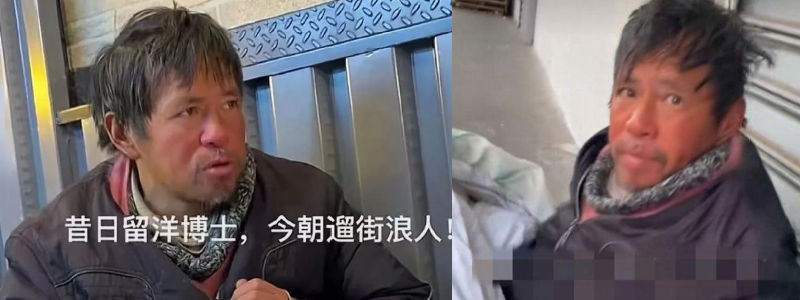
◼︎ 💍 One-third of 30-Something Urbanites Are Single | Some remarkable social trends found in China’s 2023 Population and Employment Statistics Yearbook (中国人口和就业统计年鉴2023) have recently triggered online discussions. According to the statistics, the unmarried rate among the 30-year-old population in China’s urban areas now exceeds 30%. Experts explain that this is mostly related to Chinese younger generations postponing marriage due to spending longer time in education and also because of the relatively high cost of living. At the same time, China’s rural areas have also seen a staggering decrease in marriage rates (in 25-29 age group over 47% is unmarried), which can mostly be explained due to a gender imbalance in marriageable age groups. (Weibo hashtags “30% of 30-Somethings in Chinese Cities are Single” #全国城市30岁人群未婚率超30%#, 27+ million views; “Late Marriage Trend Has Spread from Cities to Villages” #晚婚已从城市蔓延到农村#, hashtag page taken offline).
◼︎ 🍣 Fukushima Food Poisoning | Lots of Japan news went trending on Chinese social media this month, from the devastating earthquake along Japan’s western coast to the Japan Airlines jet collision. Smaller Japan news that went trending this week is a collective food poisoning incident that took place in Fukushima earlier this month. Among many guests who stayed and dined at a local Fukushima hotel, 101 people fell ill after eating raw fish. Last year, Japan also saw several other large-scale food poisoning incidents. This Fukushima incident especially went trending on Chinese social media within the context of the release of treated radioactive water from the ruined Fukushima nuclear plant, which became one of the biggest social media topics in 2023. Although unrelated, netizens link the food poisoning incident to the dangers of radioactive water (Weibo hashtag “100 people in Japan’s Fukushima Get Food Poisoning from Eating Raw Fish” ##日本福岛百人因吃生鱼片食物中毒##, 160 million views).
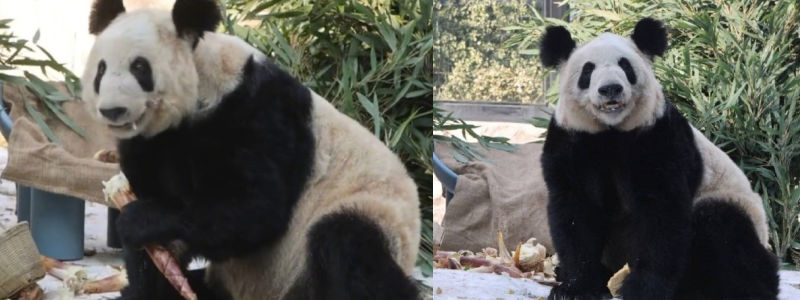
◼︎ 🐼 Yaya’s Weight Gain | Panda Yaya became one of the most discussed pandas of 2023. This female panda resided in the Memphis Zoo in the United States for most of her life and attracted significant attention on Chinese social media platforms after netizens expressed concern about her seemingly thin and unhealthy appearance. When the beloved panda finally returned to Beijing after two decades, her arrival became a true social media spectacle. Now, living in the Beijing Zoo, Yaya is often spotted enjoying her bamboo dinners and she clearly gained a lot of weight, much to the delight of netizens who see this as a sign that the panda is doing much better in China than in the US. (Weibo hashtag “Yaya Became A-Letter Chubby Panda”” ##丫丫胖成了A字熊##, 120 million views).
What’s the Drama

We’re introducing this new short Weibo Watch segment to keep you in the loop about some of the most-discussed TV dramas and series in China, as they’re a significant part of China’s online environment. While the South Korean TV drama Death’s Game (#死期将至#), of which Part 2 was released on Jan 5, has been popular on Chinese social media recently, it’s Wong Kar-wai’s Blossoms Shanghai (繁花) that is among the top trending Chinese TV dramas at the moment. The series first started airing on CCTV-8 and Tencent Video on December 27.
Adapted from Jin Yucheng’s award-winning novel, Blossoms Shanghai is set in 1990s Shanghai and tells the story of the young man A Bao (played by the ‘Weibo King’ Hu Ge 胡歌) who aims to become a successful businessman and self-made millionaire during China’s booming economic reform period. The series portrays a sharp contrast between the man’s troubled past and the city’s vibrant present. Noteworthy:
▶️ This is the first TV drama produced by Hong Kong film director Wong Kar-Wai, internationally acclaimed for movies such as Chungking Express and In the Mood for Love.
▶️ Particularly noteworthy is the inclusion of the now 91-year-old renowned Chinese actor You Benchang (游本昌), famous for his iconic role as the legendary monk Ji Gong in the 1980s. Despite his age, the actor spent entire days on set with his much younger colleagues, enduring ten-hour working days.
▶️ Due to the success of the series, locations featured in it are experiencing an influx of visitors, especially Shanghai’s Huanghe Road (黄河路). Shanghai’s Fairmont Peace Hotel on Nanjing East Road, also featured in Blossoms Shanghai, has even introduced a new menu featuring various dishes that also come up in the series.
An international/subtitled online release is expected soon, but if you’re in China, you can watch via Tencent here.
What Lies Behind
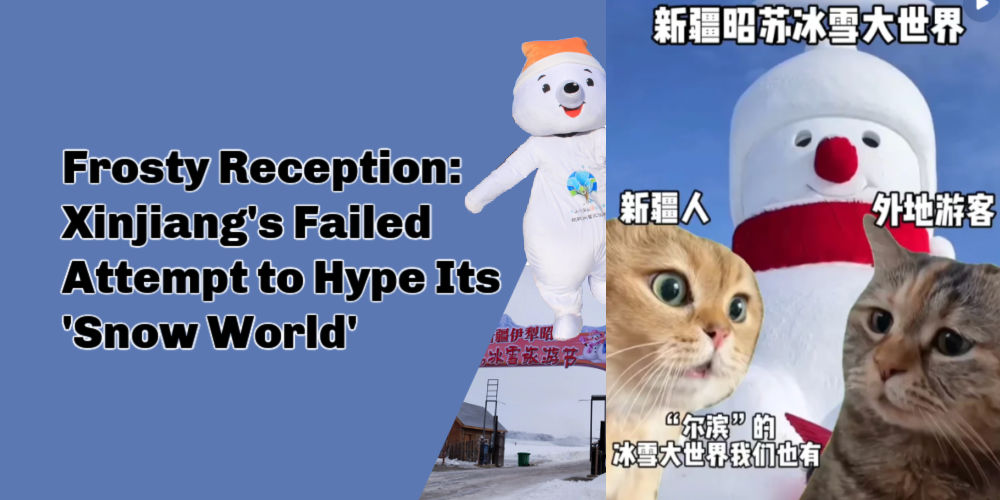
Similar to Zibo in 2023, it’s the city of Harbin that has successfully generated a significant social media buzz this season, attracting hordes of winter tourists. On the other side of Northern China, Xinjiang Province is also eager to step into the spotlight.
While the Harbin International Ice and Snow Festival celebrated its official opening ceremony on January 5th, Xinjiang’s Ili Prefecture hosted an event to promote its first Tianma Ice and Snow Tourism Festival. The Snow Festival, scheduled to open on January 14th at Zhaosu County’s Wetland Park, will feature various winter activities and ice & snow sculpture exhibitions. By incorporating folk culture elements and highlighting its numerous ski resorts, local authorities aim to position Xinjiang as the third trending tourist destination after Zibo and Harbin.
However, the ‘online buzz’ surrounding Xinjiang hasn’t unfolded exactly as they had hoped. Local Xinjiang residents began expressing their opinions on social media, including on promotional videos on Douyin, cautioning tourists about high prices. For example, they pointed out that their popular spicy fried chicken dish (辣子鸡) could cost over 200 RMB (US$28), more than double the price elsewhere in China. A well-known Xinjiang vlogger suggested that budget-conscious tourists might find visiting the region in the summer more economical, while others criticized Xinjiang for the overcharging of tourists. Following the flood of online comments, the Xinjiang Culture and Tourism Department (新疆文旅) closed several Douyin comment sections.
Xinjiang’s efforts to go viral as a tourist destination show that it takes more than official propaganda to create a buzz – people are looking for genuineness, value, and that one special thing that makes it all worthwhile. During the summer of 2023, Xinjiang actually had an initial strong moment of domestic tourism recovery. After the pandemic years and strict zero Covid policies, many Chinese travelers were eager to experience something new and prioritized unique locations over a low budget. Now that the initial travel craze phase has passed, travelers are back to focusing on getting value for money and won’t accept being overcharged.
One definite upside of this marketing fail is that Chinese netizens very much appreciate how local Xinjiang residents gave travelers the heads up about the status quo. One commenter said, “After reading all the comments, I find Xinjiangers are so honest and lovely; this made me want to go visit! Maybe next time, they [local authorities] should promote their people instead.”
What’s Noteworthy
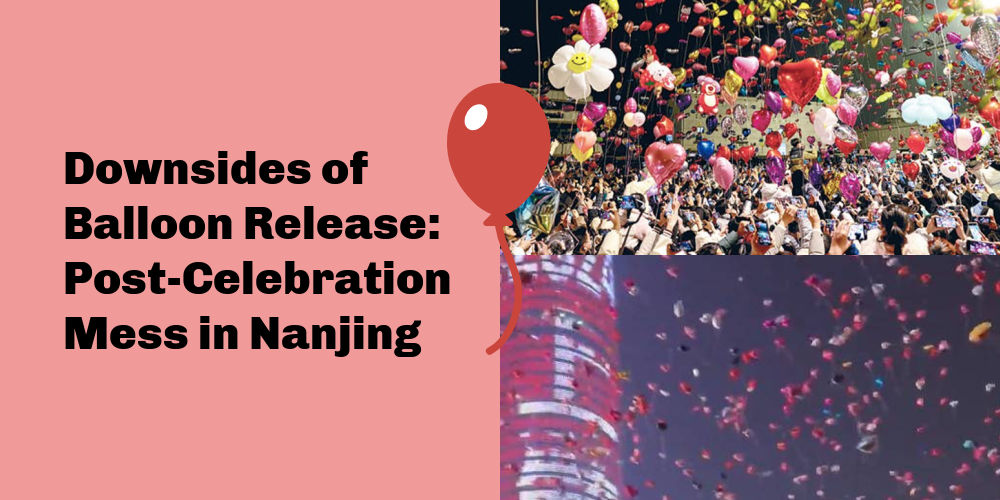
Tens of thousands of balloons were released into the sky during New Year’s Eve in Nanjing’s city center. While the scene created a spectacular count-down moment that went viral on social media, the aftermath wasn’t so pretty. In the week after the celebration, numerous balloons littered Nanjing’s commercial district — caught in trees, entangled in bushes, and even stuck on traffic lights.
To clean up this post-celebration mess, a local landscaping company was mobilized, with hundred workers utilizing multiple aerial work platforms and working around the clock for seven days to clear the Nanjing streets of the lingering balloons.
But the impact went well beyond Nanjing’s city center. Days after the event, balloons that were released in Nanjing were found as far as Hangzhou (#在杭州发现南京跨年夜气球#). Beyond the environmental impact and the extensive cleanup efforts, the use of hydrogen balloons also poses safety risks.
Hydrogen is highly flammable, and balloon encounters with high-voltage lines or open flames can result in explosions and significant damage. This actually also happened this New Year’s, creating hazardous situations for the crowds standing below the small, local explosions in the air (#跨年夜集体放飞气球引爆响#) – this is something that Chinese fire departments have also been warning about through online channels.
Nanjing is just one of the cities where thousands of balloons were released for New Year’s Eve; there were also major balloon release events in cities such as Chongqing, Chengdu, Xi’an, and Wuhan. On Weibo, numerous users have been vocal about highlighting the downsides and negative impact of these kinds of balloon releasing events.
What’s Popular

The Spring Festival holiday is known for its peak box office performances in China, with audiences eagerly anticipating the films released during this period. Last Lunar New Year, blockbuster hits like Wandering Earth II, Full River Red, and Hidden Blade made waves. This year, there’s considerable buzz around YOLO (热辣滚烫), the latest film from Chinese comedian and director Jia Ling.
Recently, Jia Ling emerged back into the spotlight after a year-long break from the public eye. On Weibo, the acclaimed actress shared that during this year, she directed her second film while also portraying the lead character. In this role, she plays a woman who drastically changes her life after being withdrawn from social life and who takes up boxing, for which Jia Ling shed approximately 100 pounds (50 kg).
Jia Ling’s remarkable weight loss for her upcoming film quickly became a trending topic, with her Weibo announcement garnering nearly 60,000 responses in just one day. Many view this dramatic change as a testament to Jia Ling’s incredible dedication to her work. After her successful and award-winning director’s debut Hi, Mom in 2021, this upcoming film is also expected to do very well during the holiday. YOLO (热辣滚烫) is set to premiere in Chinese theaters on February 10. Read more here👇.
What’s Memorable

As we’re back in the snow season, we’ve picked this article from our archive from one year ago which explores how and why Eileen Gu, the American-born freestyle skier and gold medallist, became an absolute viral sensation in China. Gu represented China in the 2022 Beijing Olympics and received praise for her excellent halfpipe World Cup performance during the 2023 Chinese New Year.
At the same time, Gu’s success also generated many discussions about her alleged privileged status, especially within the context of her being praised as a role model for Chinese (female) younger generations. Read here 👇
Weibo Word of the Week

“Southern Little Potatoes” | Our Weibo Word of the Week is “Southern Little Potatoes” (nánfāng xiǎo tǔdòu 南方小土豆).
The term “Southern Little Potatoes” (南方小土豆) is all the rage recently in the context of the hype surrounding Harbin. This ice-and-snow tourism season has seen a huge influx of tourists from the warmer southern regions who are heading north to the snow-blanketed Harbin or other destinations in the Three Northeastern Provinces (东北三省).
The southern tourists visiting China’s cold northeast tend to stand out due to their smaller stature, light-colored down jackets, and newly-bought winter hats. Their appearance not only contrasts with that of the typically taller and darker-dressed locals, but some people also think it makes them look like little potatoes. After the term ‘southern little potato’ became popular due to a viral video, some southern tourists, especially women, also adopted this term to humorously describe themselves.
The playful term quickly caught on, and locals started using it as a humorous marketing strategy to attract more southern visitors. Harbin street sellers are now selling plush keychains of “southern little potatoes,” and even local taxis are inviting the “baby potatoes” to get on board (土豆宝宝请上车) for complimentary rides. Through jokes, memes, and media stories about these ‘potatoes,’ a narrative has been constructed about the city of Harbin taking care of and pampering these ‘naive,’ ‘little’ visitors.

Although the term is meant to be affectionate, not everyone appreciates it. As the term predominantly refers to smaller women, some critics feel that by making “Southern Little Potatoes” (南方小土豆) part of its Ice and Snow economy promotion, Harbin is actually being somewhat chauvinistic and is contributing to sexism while reinforcing stereotypical perceptions of southern women.
While some critical bloggers are arguing that the term is harmful and derogatory, the majority of netizens are still using the term for light-hearted banter about the enthusiasm of southern visitors and the hospitality of the northerners welcoming them.
This is an on-site version of the Weibo Watch newsletter by What’s on Weibo. Missed last week’s newsletter? Find it here. If you are already subscribed to What’s on Weibo but are not yet receiving this newsletter in your inbox, please contact us directly to let us know.
Stories that are authored by the What's on Weibo Team are the stories that multiple authors contributed to. Please check the names at the end of the articles to see who the authors are.

China Memes & Viral
“Bye Bye Biden”: Biden’s Many Nicknames in Chinese
Throughout the years, Biden has received many nicknames on Chinese social media.
Published
5 days agoon
July 22, 2024
Our Weibo phrase of the week is Bye Bye Biden (bài bài Bàidēng 拜拜拜登). As news of Biden dropping out of the presidential race went viral on Weibo early Monday local time, it’s time to reflect on some of the popular nicknames and phrases given to US President Joe Biden on Chinese social media.
🔹 Biden in Chinese: Bàidēng 拜登
Biden in Chinese is generally written pronounced and written as Bàidēng 拜登. Although the character 拜 (bài) means “to pay respect, to worship” and 登 (dēng) means “to ascend, to climb,” they’re used here primarily for their phonetic similarity. The characters chosen are neutral to avoid any negative implications in the official translation of Biden’s name.
Why are non-Chinese names translated into Chinese at all? With English and Chinese being vastly different languages with entirely different phonetics and scripts, most Chinese people find it difficult to pronounce a foreign name written in English. Writing foreign names in Chinese not only standardizes them but also makes pronunciation and memorization easier for Chinese speakers.
🔹 Bye Biden: Bài Bài Bàidēng 拜拜拜登
Because Biden is Bàidēng, and the Chinese for ‘bye bye’ is written as bài bài 拜拜, some netizens quickly created the wordplay “bài bài Bàidēng” 拜拜拜登 (“bye bye Biden”) upon hearing that Biden would not seek reelection. Try saying it out loud—it almost sounds like you’re stammering.
🔹 Old Joe: Lǎo Dēng Dēng 老登登
Another common farewell greeting to Biden seen online is “bài bài lǎo dēng dēng” 拜拜老登登, which sounds cute due to the repetition of sounds.
“Old Biden” or “lǎo dēng dēng” 老登登 is a common online nickname for Biden in Chinese. The reduplication of the 登 (dēng) makes it sound playful and affectionate, while the “old” prefix is commonly used when referring to someone older. It’s similar to calling someone “Old Joe” in English.
🔹 Biden Variations: 拜灯, 白等, 败蹬
Let’s look at some other ways Biden is nicknamed online:
Besides the official way of writing Biden with the 拜登 Bàidēng characters, there are also other variations:
拜灯: bài dēng
白等: bái děng
败蹬: bài dèng
These alternative ways of writing Biden’s name are not neutral. Although the first variation is not necessarily negative (using the formal Biden 拜 bài character but with ‘Light’ 灯 dēng instead of the other 登 ‘dēng’), the other two variations are usually used in more negative contexts.
In 白等 (bái děng), the first character 白 (bái) means “white,” which can evoke associations with old age due to white hair (白发). The character 等 (děng) means “to wait,” and the combination can imply being old and sluggish.
败蹬 (bài dèng) is typically used by netizens to reflect negative sentiments towards the American president. The characters separately mean 败 (bài): “to be defeated,” “to fail,” and 蹬 (dèng): “to step on,” “to kick.” This would never be used by official media and is also often used by netizens to circumvent censorship around a Biden-related topic.
🔹 Revive the Country Biden: Bài Zhènhuá 拜振华
Then there is 拜振华 Bài Zhènhuá: revive the country Biden
In recent years, Biden has come to be referred to with the Chinese nickname “Revive the Country Biden,” also translatable as ‘Thriving China Biden’. This nickname has circulated online since 2020 and matches one previously given to former President Trump, namely “Build the Country Trump” (Chuān Jiànguó 川建国).
The idea behind these humorous monikers is that both Trump and Biden are seen as benefitting China by doing a poor job in running the United States and dealing with China.
🔹 Sleepy King: Shuì wáng 睡王
Shuì wáng 睡王, Sleepy King, is another common nickname, similar to the English “Sleepy Joe.” During and after the 2020 American presidential elections, there were numerous discussions on Chinese social media about ‘Trump versus Biden.’ Many saw it as a contest between the ‘King of Knowing’ (懂王) and the ‘Sleepy King’ (睡王).
These nicknames were attributed to Trump, who frequently boasted about his unparalleled understanding of various matters, and Biden, who gained notoriety for being older and tired. Viral videos, some manipulated, showed him nodding off or seemingly disoriented. The name ‘Sleepy King’ then stuck.
🔹 Grandpa Biden: Bài Yéyé 拜爷爷
Throughout the years, Biden has also been nicknamed Bài yéyé 拜爷爷, “Grandpa Biden.” This is usually more affectionate, though it emphasizes his age—Trump is not much younger than Biden and is not nicknamed ‘Grandpa Trump.’
Another similar nickname is lǎo bái 老白, “Old White,” referring to Biden’s age and white hair. 白 (bái, white) can also be a surname in Chinese. This nickname makes it seem like Biden is an old, familiar friend.
On Weibo, many speculate that American Vice President Kamala Harris will be the new candidate for the Democrats, especially since she’s been endorsed by Biden. Many have little confidence that she can compete against Trump. Her Chinese name is Kǎmǎlā Hālǐsī 卡玛拉·哈里斯, commonly referred to as ‘Harris’ (Hālǐsī).
In light of the latest developments, some netizens jokingly write: “Bye bye Biden, Ha ha ha, Harris.” (Bài bài, Bàidēng. Hā hā hā, Hālǐsī 拜拜,拜登。 哈哈哈,哈里斯). With a new Democratic candidate entering the presidential race, we can expect a fresh batch of creative nicknames to join the mix on Chinese social media.
Want to read more? Also read: Why Trump has Two Different Names in Chinese.
By Manya Koetse
Spotted a mistake or want to add something? Please let us know in comments below or email us. First-time commenters, please be patient – we will have to manually approve your comment before it appears.
©2024 Whatsonweibo. All rights reserved. Do not reproduce our content without permission – you can contact us at info@whatsonweibo.com.
China Memes & Viral
Enjoying the ‘Sea’ in Beijing’s Ditan Park
This “seaview” spot in Beijing’s Ditan Park has become a new ‘check-in spot’ among Chinese Xiaohongshu users and influencers.
Published
2 weeks agoon
July 15, 2024
“‘The sea in Ditan Park’ is a perfect example of how Xiaohongshu netizens use their imagination to change the world,” a recent viral post on Weibo said (“地坛的海”完全可以入选《红薯人用想象力颠覆世界》的案例合集了”).
The post included screenshots of the Xiaohongshu app where users share their snaps of the supposed seaview in Beijing’s Ditan Park (地坛公园).
Ditan, the Temple of Earth Park, is one of the city’s biggest public parks with tree-lined paths and green gardens in Beijing, not too far from the Lama Temple in Dongcheng District, within the Second Ring Road.
On lifestyle and social media platform Xiaohongshu, users have recently been sharing tips on where and how to get the best seaview in the park, finding a moment of tranquility in the hustle and bustle of Beijing city life.

Post on Xiaohongshu to get the seaview in Ditan Park.
But there is something peculiar about this trend. There is no sea in Ditan Park, nor anywhere else in Beijing, for that matter, as the city is located inland.
The ‘seaview’ trend comes from the view of one of the park’s stone walls. In the late afternoon, somewhere around 16pm, when the sun is not too bright, the light creates an optical illusion from a certain viewpoint in the park, making the wall behind the bench look like water.

You do have to capture the right light at the right moment, or else the effect is non-existent.

Some photos taken at other times of the day clearly show the brick wall, which actually doesn’t look like a sea at all.

Although the ‘seaview in Ditan’ trend is popular among many Xiaohongshu users and influencers who flock to the spot to get that perfect picture, there are also some social media commenters who criticize the trend of netizens always looking for the next “check-in spot” (打卡点).
There are also other spots popular on social media that look like impressive areas but are actually just optical illusions. Here are some examples:


One Weibo user suggested that this trend is actually not about people appreciating the beauty around them, but more about chasing the next social media hype.

The Ditan seaview trend is not entirely new. In May of this year, Beijing government already published a post about the “sea” in Ditan becoming more popular among social media users who especially came to the park for the special spot.
The Beijing Tourism Bureau previously referred to the spot as “the sea at Ditan Park that even Shi Tiesheng didn’t discover” (#在地坛拍到了史铁生都没发现的海#).
Shi Tiesheng (1951–2010) is a famous Chinese author from Beijing whose most well-known work, “Me and Ditan,” reflects on his experiences and contemplations in Ditan Park. At the age of 21, Shi Tiesheng suffered a spinal cord injury that left him paralyzed from the waist down. Ditan Park became a place for him to ponder life, time, and nature. Despite the author’s deep connection with the park, he never described seeing a “sea” in the walls.

Shi Tiesheng in Ditan Park.
If you are visiting Ditan Park and would like to check out the ‘sea’ yourself in the late afternoon, there are guides on Xiaohongshu explaining the route to the viewpoint. But it should not be too difficult to find this summer—just follow the crowds.

By Manya Koetse and Ruixin Zhang
Spotted a mistake or want to add something? Please let us know in comments below or email us. First-time commenters, please be patient – we will have to manually approve your comment before it appears.
©2024 Whatsonweibo. All rights reserved. Do not reproduce our content without permission – you can contact us at info@whatsonweibo.com.
Subscribe

Weibo Watch: The Future is Here

“Bye Bye Biden”: Biden’s Many Nicknames in Chinese

Enjoying the ‘Sea’ in Beijing’s Ditan Park

A Triumph for “Comrade Trump”: Chinese Social Media Reactions to Trump Rally Shooting

Weibo Watch: Get Up, Stand Up

The Tragic Story of “Fat Cat”: How a Chinese Gamer’s Suicide Went Viral

“Old Bull Eating Young Grass”: 86-Year-Old Chinese Painter Fan Zeng Marries 36-Year-Old Xu Meng

A Brew of Controversy: Lu Xun and LELECHA’s ‘Smoky’ Oolong Tea

Singing Competition or Patriotic Fight? Hunan TV’s ‘Singer 2024’ Stirs Nationalistic Sentiments

Zara Dress Goes Viral in China for Resemblance to Haidilao Apron

Weibo Watch: The Battle for the Bottom Bed

About the “AI Chatbot Based on Xi Jinping” Story

China’s Intensified Social Media Propaganda: “Taiwan Must Return to Motherland”

Weibo Watch: Telling China’s Stories Wrong

Saying Goodbye to “Uncle Wang”: Wang Wenbin Becomes Chinese Ambassador to Cambodia
Get in touch
Would you like to become a contributor, or do you have any tips or suggestions? Get in touch here!
Popular Reads
-

 China Insight3 months ago
China Insight3 months agoThe Tragic Story of “Fat Cat”: How a Chinese Gamer’s Suicide Went Viral
-

 China Music4 months ago
China Music4 months agoThe Chinese Viral TikTok Song Explained (No, It’s Not About Samsung)
-

 China Digital10 months ago
China Digital10 months agoToo Sexy for Weibo? Online Discussions on the Concept of ‘Cābiān’
-

 China Arts & Entertainment12 months ago
China Arts & Entertainment12 months agoBehind 8 Billion Streams: Who is Dao Lang Cursing in the Chinese Hit Song ‘Luocha Kingdom’?





